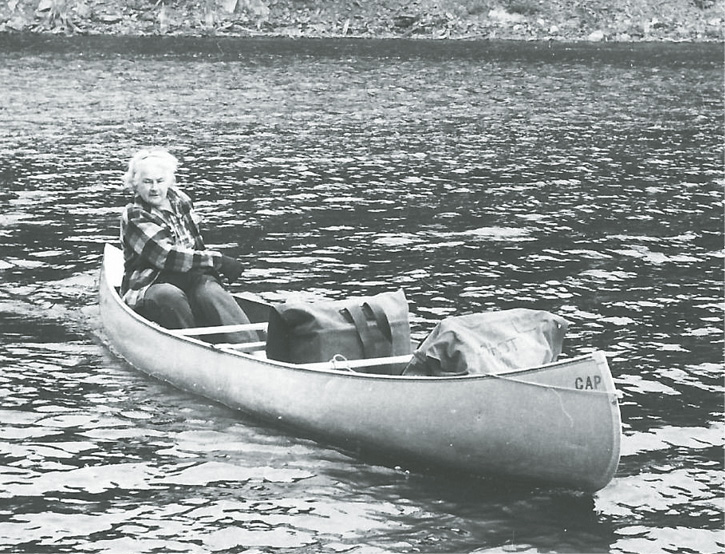Across the remote regions of northern Minnesota and the United States, as well as Canada, numerous women have forged a path into untamed landscapes, reshaping the concepts of independence, self-sufficiency, and societal norms.
Dorothy Molter, commonly known in the Ely area of Minnesota and far beyond as the “Root Beer Lady,” is a prime example of one of these women.
From an early age, Molter sought out non-traditional activities and roles. As she was pursuing a nursing degree rather than a hand in marriage, she spent a college break vacationing with her family at a resort at Isle of the Pines on Knife Lake, located along the international border between Minnesota and Ontario, within what is now the Boundary Waters Canoe Area Wilderness (BWCAW). Little did she know at the time that the resort would become a centerpiece of her life and ignite a lifelong passion for an independent outdoor lifestyle.
After returning to Isle of the Pines resort each year to work alongside owner Bill Berglund, Molter eventually took over the resort and spent more than 56 years living on Isle of the Pines, offering solace and refreshing root beer to passersby.
“One of the things that I find especially rewarding is that Dorothy’s story is unique, interesting, and inspiring,” said Dorothy Molter Museum executive director Jess Edberg. “How she came from a big city, and really connected with the Northwoods and found herself and found what she was passionate about.”
Throughout her years living on Isle of the Pines, she faced many challenges as she adapted to the regulatory changes of the 1964 Wilderness Act and, shortly after, the creation of the BWCAW in 1978.
Despite these regulatory changes, the U.S. Forest Service allowed Molter to reside on the island, but following the formation of the BWCAW, her resort operations had to cease. Eventually, with the help of her friends who rallied behind her, the U.S. Forest Service granted her lifetime tenancy until she passed away in December of 1986.
Her unwavering determination, tenacity, and kind spirit inspired many who journeyed through the region or assisted in delivering supplies. She forged numerous meaningful connections over her 56 years of residing in the secluded wilderness. These enduring relationships and friendships would ultimately pave the way for establishing the Dorothy Molter Museum after her passing.
The following winter in 1987, Molter’s friends organized a memorial snowmobile ride to Isle of the Pines with a one-day permit approved by the U.S. Forest Service. Shortly after, the U.S. Forest Service planned to remove Molter’s structures and personal items and return the island to its natural state to blend into the wilderness character of the BWCAW. Fortunately, Molter’s devoted friends took the initiative to gain permission to salvage and preserve Molter’s cabins and personal belongings. Due to the remoteness and non-motorized laws, the process proved arduous. Numerous volunteers and stakeholders became involved in the project, including the City of Ely, the Minnesota Historical Society, the Outward Bound School, and the Northern Tier High Adventure Boy Scouts of America.
“It was a 100 percent volunteer effort,” Edberg said.
Eventually, Molter’s cabins and belongings were transported 30 miles away to Ely. Shortly after, the friends group formed a nonprofit called the Dorothy Molter Memorial Foundation. Then, with a bit more hard work, they opened the Dorothy Molter Museum on May 6, 1993—Molter’s birthday.
Edberg, who has been with the Dorothy Molter Museum since 2014, hopes visitors recognize that Molter was “more than just the root beer.” While that was a big part of her story, she admires Molter for her independence and perseverance and because she was doing what made her happy and, by doing so, made other people happy. In addition, she wishes that visitors learn more about the complex history of the creation of the Boundary Waters. “I really think it’s important for people to understand that,” Edberg said.
Edberg said it has been a long and trying road to create the Dorothy Molter Museum, but they are grateful to be celebrating their 30th anniversary this year. To celebrate the milestone, the museum held three open houses during the summer, including a root beer-making demo, anniversary buttons, and a showing of a documentary featuring Molter’s life at the Ely State Theatre with a special guest panel discussion afterwards. Also, the museum recently added a new exhibit panel focused on how Molter became known as the “Root Beer Lady.”
Reflecting on Molter’s legacy, Edberg said she is an inspiration for young people who are trying to figure out their place in life and perhaps break outside of expectations or set rules. “She’s kind of a role model in a way for folks to show that you can do these things too.”

